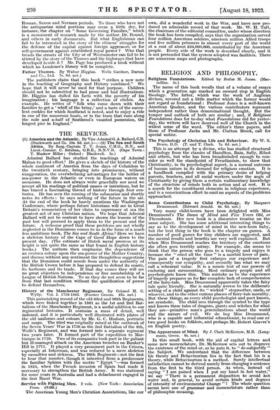THE SERVICES.
(1) America and the Atlantic. By Vice-Admiral G. A. Ballard, C.B. (Duckworth and Co. 10s. 6d. net.)—(2) The Sea and South Africa. By Surg.-Captain T. T. Jeans, C.M.G., R.N., and Lieut.-Commr. C. Struben, O.B.E., R.N.V.R. (Cape Town.: T. Maskew Miller ; Oxford : Blaokwell. 3s.) Admiral Ballard has studied the teachings of Admiral Mahan to good effect .1 He gives a sketch of the history of the whole continent of America from the days of Columbus to the twentieth century, bringing into prominence, without exaggeration, the overwhelming advantages for the holder of sea-power in the Atlantic or even in European waters on occasions. He does not always write gracefully nor need we accept all his readings of political causes or intentions, but he has traced a fascinating thread of history through four centuries. He has seen the coming of the submarine and shortly notes its effects : he says nothing of the future in the air. At the end of the book he barely mentions the Washington. Conference, where perhaps future historians will see in Great Britain's renunciation of her claim to supremacy at sea the greatest act of any Christian nation. We hope that Admiral Ballard will not be content to have shown the -lessons of the past but will proceed to apply them to the present and the future. A welcome proof that these problems are not wholly neglected in the Dominions comes to us in the form of a much less ambitious book, The Sea and South Africa? Here we have a skeleton history of the Cape of Good Hope down to the present day. (The estimate of Dutch naval prowess at its height is not quite the same as that found in English history books.) The 'authors then emphasize the dependence of an oversea colony upon the sea-power of the Mother Country, and discuss without any sentiment the thoughtless suggestions that the Dominion could secede from under the authority of the British Crown before it has prepared to defend its coasts, its harbours and its trade. If that day comes they will see no great objection. to independence or free membership of a League of British Nations. 'To us they do not seem to be far from that last condition without the qualification of power to defend themselves.
History of the Manchester Regiment. By Colonel H. C. Wylly. Vol. I. 1758-1883. (Forster Groom. 428. net.)
This painstaking record of the old 63rd and 96th Regiments, which were linked together in 1881 as the 1st and 2nd Battalions of the Manchester Regiment, is a useful addition to our regimental histories. It contains a mass of detail, well indexed, and it is particularly well illustrated with plates of the old uniforms .and•colours by Mr. G. C. Hudson, portraits and maps. The 63rd was originally raised at the outbreak of the Seven Years' War in 1756 as the 2nd Battalion of the 8th, Wolfe's Regiment, and was formed into a separate regiment two years later. It formed part of the expedition to Martinique in 1759. Two of its companies took part in the gallant but ill-managed attack on the American trenches on •Bunker's Hill in 17V5. It played a very prominent part in the Crimea, especially at Inkerman, and was reduced to a mere skeleton by casualties and sickness. The 96th Regiment—not the first to bear that number, though it inherited from a predecessor the familiar Sphinx with the motto " Egypt "—was formed in 1824, when the French invasion of Spain had made it necessary to strengthen the British Army. It was stationed for some years in Australia and had a detachment engaged in the first Maori War.
Service with Fighting Men. 2 vols. (New York : Association Press. 0.004 The American Young Men's Christian Associations, like our
own, did a wonderful work in the War, and have now produced an admirable -record of that work. Mr. W. H. Taft, the chairman of the editorial committee, under whose direction the book has been compiled, says that the organization served four -million American soldiers, nineteen million Allied troops and five million prisoners in almost every part of the world at a cost of about 234,000,000, contributed by the American people. Every side of the work is described clearly, and it is not pretended that the system adopted was faultless. There are numerous maps and photographs.


































 Previous page
Previous page